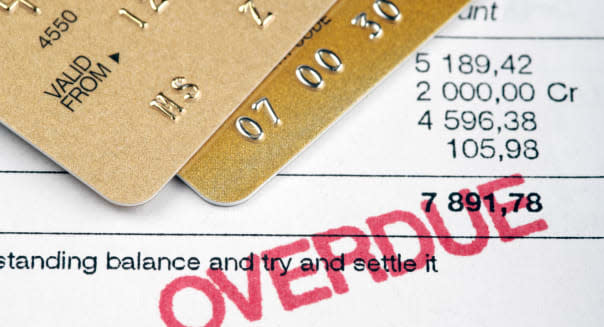How Much Are Those 'Dings' to Your Credit Score Costing You?

It happens. You forget to mail in a payment, or maybe you hold off because you don't quite have the funds in your checking account. You know a late or missed payment will ding your credit score, but how much do a few points matter, really?
A lot, it turns out.
Consider a hypothetical borrower in my home town of Alexandria, Va., who takes out a $500,000 mortgage. According to MyFICO.com, she could get a rate anywhere between 4.019 percent and 5.602 percent depending on her credit score.
Take a look at how the difference in rate affects her monthly payments and the total interest she'll pay over the life of her 30-year loan.
FICO Score | APR | Monthly Payment | Total Interest Paid |
|---|---|---|---|
760-850 | 4.019% | $2,393 | $361,320 |
700-759 | 4.24% | $2,457 | $384,438 |
680-699 | 4.417% | $2,509 | $403,178 |
660-679 | 4.63% | $2,572 | $425,990 |
640-659 | 5.058% | $2,702 | $472,669 |
620-639 | 5.602% | $2,871 | $533,569 |
As of Jan. 26, 2014. Source: MyFICO.com.
The $64,000 Question
Let's say you have a better-than-average FICO score falling somewhere in the 730 range. With that score you're in good standing to qualify for a mortgage APR of 4.24 percent.
But a few small slip-ups -- like a few late or missed payments -- could cost our hypothetical homeowner a lot. At 736, she'd pay $2,457 per month and $384,438 total interest for the life of the loan. But with a ding or two that drops her score down to 679, she'd pay $115 more per month and $41,552 more in interest payments overall. That's a whopping $64,670 more over the life of the loan than a borrower whose score is just 81 points higher, at 760. (And it doesn't take much to cause a quick drop in your credit score. MyFico offers these details about how much specific mistakes will hit your credit score.)
Not in the market for a mortgage? Less-than-stellar credit will cost you on a car loan, too. A borrower with an average credit score of 736 will pay $39 more per month on a three-year, $20,000 loan than her neighbor who has a score above 760 -- that's an extra $1,404 over the life of the loan.
So What Can You Do?
Far too many Americans -- 47 percent according to a CouponCabin.com survey -- don't even know their credit scores. If you're one of them, your first step should be to get your credit report from annualcreditreport.com. (That's the site set up by the three major credit agencies to fulfill their legal mandate to provide us with free, no-strings attached copies of your credit reports.)
%VIRTUAL-article-sponsoredlinks%Keep in mind that there is no single, universal score -- each of us has at least three, and credit blog ReadyForZero says we may have as many as 40! These scores can vary, making it hard to get a handle on your creditworthiness, but you have to start somewhere, so getting a hold of any of your scores is a good start.
Once you know where you stand, you can take steps to improve your standing. The most effective strategy is the simplest: Pay your bills on time every month. If you find yourself in a bind, don't shove the bill in a drawer: Call the creditor and ask for an extension. Do you have a bill that always comes due just before payday? Ask if you can change the payment due date.
Also, don't close any credit accounts while you're working to build up your score. Doing so may seem like a good way to avoid racking up more debt, but it can actually hurt your credit score.
You also don't want to apply for a bunch of new cards, either, as that can also ding you. (Find more tips on boosting your score here.)
Most important, don't get discouraged by past mishaps; recent credit activity counts more for your score than past behavior, so even if you've messed up in the past, resolve to turn over a new credit leaf right now. You'll see an improvement in your score after just a few months of on-time payments.
Whatever you do, don't ignore your credit score. It's one of the most important grades you'll ever get.

Robyn Gearey is a Motley Fool contributing writer. Try any of our Foolish newsletter services free for 30 days.

